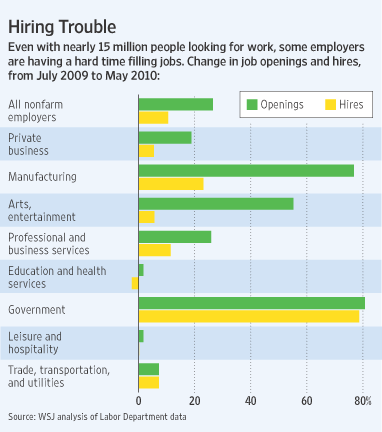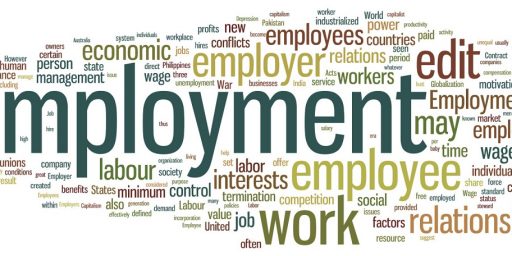Unemployment Paradox: Vacant Jobs Unfilled
Despite 9.5% unemployment, American firms are struggling to find qualified applicants for job openings.
WSJ reports on a strange phenomenon:
With a 9.5% jobless rate and some 15 million Americans looking for work, many employers are inundated with applicants. But a surprising number say they are getting an underwhelming response, and many are having trouble filling open positions.
“This is as bad now as at the height of business back in the 1990s,” says Dan Cunningham, chief executive of the Long-Stanton Manufacturing Co., a maker of stamped-metal parts in West Chester, Ohio, that has been struggling to hire a few toolmakers. “It’s bizarre. We are just not getting applicants.”
What’s causing the problem?
Employers and economists point to several explanations. Extending jobless benefits to 99 weeks gives the unemployed less incentive to search out new work. Millions of homeowners are unable to move for a job because the real-estate collapse leaves them owing more on their homes than they are worth.
The job market itself also has changed. During the crisis, companies slashed millions of middle-skill, middle-wage jobs. That has created a glut of people who can’t qualify for highly skilled jobs but have a hard time adjusting to low-pay, unskilled work like the food servers that Pilot Flying J seeks for its truck stops.
[…]
Matching people with available jobs is always difficult after a recession as the economy remakes itself. But Labor Department data suggest the disconnect is particularly acute this time around. Since the economy bottomed out in mid-2009, the number of job openings has risen more than twice as fast as actual hires, a gap that didn’t appear until much later in the last recovery. The disparity is most notable in manufacturing, which has had among the biggest increases in openings. But it is also appearing in other areas, such as business services, education and health care.
[…]
Longer-term trends are at play. For one, the U.S. education system hasn’t been producing enough people with the highly specialized skills that many companies, particularly in manufacturing, require to keep driving productivity gains. “There are a lot of people who are unemployed, but those aren’t necessarily the people employers are looking for,” says David Autor, an economist at the Massachusetts Institute of Technology.
We’ve been discussing these issues a lot on the blog and at OTB Radio. And our colleague Dave Schuler has done a whole series of posts on the demographic challenges at his own place.
As to the specific issue above, Dave observes:
When it comes to acquiring highly specialized skills, particularly those for which the total number of people who can be expected to use them or that are likely to change dramatically over time, acquiring the skills takes on an element of risk. Who bears the risk? Historically, employers have borne the risk of such training but global competition may have produced an environment in which employers would rather move their operations than teach the skill necessary to maintain them.
If employers are no longer able to bear the risk, can prospective employees? IMO it’s quite possible that some of the reason for the lingering high level of unemployment is that prospective employees aren’t willing or, possibly, aren’t able to bear the risks of acquiring specialized skills for which the likelihood of actually using it may be chancy. I recall the many stories of people who learned to be medical billing specialists only to discover later that jobs for medical billing specialists had gone to India.
Kevin Drum is somewhat dubious of the paradox’ existence:
Even if there’s a shortage of high-skill workers, that’s a long-term problem, not something caused by the recession. In fact, as the chart accompanying the story shows, the number of high-skill job openings has declined since 2008. At the very least, then, companies should be having an easier time — slightly easier, anyway — filling their open positions unless either (a) they’ve lowered their wages or (b) high-skill workers are literally retiring en masse. Whatever it is, something doesn’t quite add up here.
Yves Smith comes up with a sociological explanation:
A core issue is that the employer-employee relationship has broken down. Quaint as it may sound, there once was a tacit commitment: a worker who competent and dedicated could expect to spend a considerable amount of his career at with one firm (in the 1980s, job tenures of less than five years needed to be justified). But as cost cutting and short term earnings fixation became more pervasive, average time of employment shortened greatly. And with that came a major shift in behavior: it made less and less sense for employers to hire talented people with good general competence and character and train them. They’d be unlikely to recoup the cost of the investment. Instead, companies started more and more to seek staff, in that horrid corporate cliche, who could hit the ground running. For instance, headhunters would increasingly be tasked to find someone who was doing exactly the same job at a competitor firm. This tendency goes all the way down the food chain; for instance, I’m told it’s impossible to become a bartender in NYC unless you have at least two years of bartending experience.
Now what does this mean from a price standpoint? If you believe in the most basic construct in economics, the supply and demand curve, if you restrict supply (by requiring that workers have very particular skills), the result is a higher price. Yet some employers seem to think because the economy is in the crapper, they should be able to hire cheaply. But 16.5% unemployment nationally does not necessarily mean 16.5% unemployment in their geographic and skill niche.
It’s, of course, a two-way street. No firm wants to invest tons of money in training someone only to see him take the skills to a competitor. So it’s a Catch-22.








Some of your commentators have been warning of structural unemployment, and tying that to globalization, for a year or more.
This is hardly a paradox. Employers hire in the US when location matters (either for group communication or for physical transportation costs) or when a skill and infrastructure is not more cheaply available overseas. With free trade, cheap shipping, and a US minimum wage the deck is stacked at the low end. With increasing skills and infrastructure in Asia, the definition of ‘low end’ has been moving up.
This not-a-paradox will not be resolved until Asia reaches wage parity, or unless the US tires of these trade dynamics.
I don’t think Kevin completely grasps what’s at issue. “High skills jobs” are not fungible. Even somebody who’s a highly skilled operator of one complex computer-controlled tool doesn’t automatically become highly skilled at operating another. Architects aren’t ipso facto ready to be medical technicians. With retraining they might be but just being an architect doesn’t mean you’re a medical technician, too.
When I graduated from high school I went into the Air Force and didn’t bother with college. When I got out I went to work as a press operator at a Plastics factory and over the course of of about two years worked my way up to being a Quality Manager with no college education at all. I’ve been with the company about 13 years now, almost all of it in the same position. A couple of years ago I decided I’d get at least a 2 year degree so I racked up about $15k in debt. The goal of course was to use that degree to either advance my self further in the company or to help if I choose to change companies but it really hasn’t gotten me anything and now I wonder if I wouldn’t have been much better off saving that 15k.
But, Dave, Kevin does ask this question:
Arnold Kling had a good exposition on this problem a few days ago: When Labor Is Capital: The Limits of Keynesian Policy As he posits, labor is no longer an amorphous input but rather an investment in specialization. Thus the keynesian method of throwing cash at unemployment are falling short. It doesn’t help that many government policies are seeking to decrease the return on investments into labor by increasing its cost.
I believe what we are now seeing the final act of the changes begun in the manufacturing “adjustment” in the 1980s. The loss of manufacturing dumped a lot of skilled labor into the market. Firms were able to pick up a skilled employee off the street and so stopped investing in development. Also, with a glut, younger workers could not enter skilled blue collar fields very easily. Now those 1980s displaced workers are retiring and firms are finding the skill set isn’t just lying about for them to pick up and toss aside as needed. Some firms are now making the investments into training programs. A young, (30) family member just completed a building maintenance program for a department store. Up until a few years ago, there were plenty of people who could handle the work available in the market. The company paid his tuition in exchange for a commitment while he also worked as an apprentice. Unfortunately, the attrition rate in the program was pretty high as students failed, dropped out or just didn’t have the discipline. Unfortunately, we can’t depend on trade unions for this training as they would require many different union employees to do the same work with much of their time being paid to sit around waiting for work. I remember back when I was was younger I was talking to a painter who worked on building a TVA nuclear plant. One day the bulb in the room they were painting burned out, so by union contract rules, they had to sit around for two weeks until the union electrician got around to changing the bulb.
In the end, workers now have to put effort into having the skills before everyone realizes they are needed. A rough task but that’s investing. If you wait until the schools are selling the skills it’s to late. There were many unemployed rocket scientists in the 1970s, unemployed programmers in the early 200s and many unemployed lawyers today. All people who got on the band wagon after the market had peaked. Is it fair, no. Does the education system prepare students for it, no. But it is how it is. Sadly, a hunger strike (UNEMPLOYEDJD.COM | Supporting Law School Transparency & Career Counseling Reform) isn’t the solution.
Sam, they will if they have to. If they’ve got a half-million dollar machine waiting for an operator, then they need an operator. Period. (That is then a location-tied job, because the machine is here.) Now, they may squawk, because they’d rather a guy walk in who has been running that machine for 10 years … but if they can’t find him they’ll have to train.
Now, the thing about improving infrastructure in Asia is that it is much more likely to have people capable of running expensive machines that it was twenty years ago. I mean, look at the notebook computer manufacturing lines. At this point they can only be in Asia.
“they’d rather a guy walk in who has been running that machine for 10 years … but if they can’t find him they’ll have to train.”
Yeah, but, if JJ’s right, we are cast in some kind of labor paradox:
“No firm wants to invest tons of money in training someone only to see him take the skills to a competitor. So it’s a Catch-22.”
That is kind of nuts, though, right? The companies need the manpower to stay in business, but they won’t train the manpower for fear it will hie itself to the competition. So, they don’t train the needed workers and the business suffers. What does it suffer from more: the competition (and it’s supposed poaching) or the lack of skilled workers?
I think the data set above needs to be looked at in conjunction with the data sets here:
http://www.fivethirtyeight.com/2010/08/labor-market-realignment-conclusion.html
There’s a fundamental sector misalignment here. 60% of the jobs lost in the last three years were in manufacturing or construction. But construction is not hiring at all now, and while manufacturing is, it seems clear that the sector is realigning around some very different technical skill sets (I do think this bodes well for some future job growth, incidentally).
But laid-off construction workers – who often do have substantial skills, albeit highly specialized ones – are going to have some trouble getting equivalent jobs in manufacturing, but a LOT of trouble in arts and entertainment. Or private business/business services, for that matter. Or healthcare. Most of those jobs do require significantly higher levels of schooling – fairly or not.
Anyone remember what a car cost before the government started to tell the manufacturers what they build into their cars, how much milage they had to get? Remember when they built cars in California? Remember when the Datsun HoneyBee got 50 mpg in the 1970’s. As I recall, employment is branch of the market. I a free market, profit motivates employers to hire during times of growth when demand exceeds capacity. There are many other factors, but when consumer confidence is low and taxes and uncertainty rising due to government programs and the potential job killing effect of climate control legislation as well as the end of the Bush tax cuts. Unemployment will remain high. James, real unemployment is around 22%. The numbers you quote are as accurate as Pelosi’s prediction they will retain the House.
When you live a lifetime (not there yet), the oddest things happen. Here is Bill Gross on the “New Normal.” Last paragraph….
Despite his long-held belief in free markets, smaller government and lower taxes, Mr. Gross said politicians must recognize that this time, “government is part of the solution.” He added, “In the new-normal world, there are structural problems, which require structural solutions.”
Jobless and Staying That Way – NYTimes.com
I think James’ paradox requires that companies prefer idle machines to trained workers, which doesn’t make sense to me.
Others have commented on a related issue, one that might be a paradox. That is, we automated factories here in the us to ‘keep jobs’ but the jobs we ‘kept’ are not the ones we lost. A few new higher skills jobs replaced many lower skilled ones.
Anyone remember what a car cost before the government started to tell the manufacturers what they build into their cars,
Yup. Also remember how many people died needlessly because there were no seat belts and when you could not see the San Gabrial Mountains from downtown LA. The good old days.